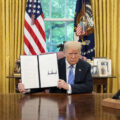Ignoring the Warning Signs: Why Did the Canadian Government Dismiss the Trade Risks of a D
June 28, 2025
U.S. President Donald Trump announced yesterday that he was suspending trade negotiations with Canada due to the imminent implementation of the digital services tax (DST). The result could be increased tariffs on Canadian products and a stalemate on many of the current trade battles between the two countries. This result should not come as a surprise. Indeed, the prospect of a trade war over the DST has been readily apparent for years. In my Law Bytes podcast episode in May on Canadian digital policy under Prime Minister Mark Carney, it was the top short term issue (I did not anticipate burying lawful access in a border bill).
Just prior to Trump’s inauguration in January, I wrote:
The U.S. Administration under President Biden registered concerns with digital services taxes, but President Trump has served notice that he is ready to take action given that the vast majority of costs are borne by U.S. companies. The most obvious target is the digital services tax, which took effect on a retroactive basis dating back to 2022 last year. The first payments are due in July with estimates that the revenues from the DST could run into the billions of dollars. The U.S. has already filed for dispute resolution on the DST, but one of President Trump’s executive orders calls for investigations of any foreign countries that “have any tax rules in place, or are likely to put tax rules in place, that are extraterritorial or disproportionately affect American companies.” The Canadian DST surely qualifies and Canada’s bet that retaliation was a bluff predictably looks like a bad one. Given the efforts of the major tech companies to curry favour with the new U.S. administration, expect the elimination of the tax to emerge as a key U.S. demand.
Last year, I wrote in the Globe and Mail:
Businesses fear the DST costs will ultimately be passed along by the tech companies, making digital advertising more expensive and rendering Canadian businesses less competitive online. But the bigger concern stems from the prospect of U.S. tariff retaliation. The U.S. Trade Representative, which leads the U.S. government on trade matters, has said it is open to using “all available tools that could result in meaningful progress toward addressing discriminatory digital-services taxes.” Much like the bet that Meta was bluffing when it said it would block news links in response to legislation that amounted to a link tax, the Canadian government is once again gambling that the U.S. government threat is just a bluff.
While a DST may be a good approach (particularly if part of a global system), the Canadian plan to implement the tax retroactively next year creates some significant risks. In fact, our current approach raises the prospect of U.S. tariff retaliation, opposition from many allies at the OECD, and expanded news link blocking in response to Bill C-18.
The Canadian decision to push ahead now is puzzling given that an international consensus is precisely the approach that benefits Canada, since it provides the prospect of new revenues with the cover of a global agreement that removes the risk of tariff retaliation. There is unquestionably a need to ensure that large multinational companies – whether tech or otherwise – pay their fair share. But there is also a need for Canada to be strategic in implementing such policies. Launching into new digital services tax legislation two years before it is scheduled to take effect while there is both an international agreement on the table and mounting disputes with the U.S. seemingly invites further trade escalation with no real benefits from years to come.
In other words, you can have many reactions to the current DST battle, but surprise should not be one of them. Canada pushed ahead despite efforts at an international agreement on the issue and later dismissed the increasing friction over the issue with the U.S., which has been signalling its opposition to the DST for many years. Donald Trump has taken action, but his views are not dissimilar from Joe Biden’s on the issue nor Members of Congress from both parties. Further, the companies directly affected by the rules have been similarly responsive. For example, Google began levying a 2.5% DST fee on Canadian advertisers last year in anticipation of the DST taking effect in 2025, thereby passing along much of the DST cost to Canadian businesses and consumers.
To be clear, Canada is free to adopt whatever tax policies it wants and tech companies should pay their fair share of taxes. Ensuring tech companies collect and remit sales taxes on digital sales and services is now well established in Canada. But the government’s policy of “making web giants pay” by going above taxes all companies pay with a percentage of revenues to support Canadian film and television, millions for the news sector, and now the DST was always going to spark a reaction.
Further, the Canadian DST is exceptionally complex, covering a wide range of digital revenues that occur in Canada. The baseline applicability is for companies that generate 750 million euros (about C$1.1 billion) in global revenue of which at least $20 million is digital services revenue in Canada. Digital services revenue can arise from (1) online marketplace services revenue (which would cover an Ebay, Airbnb or Uber), (2) online advertising services revenue (Google or Microsoft), (3) social media services revenue (Facebook or TikTok), and (4) user data revenue (any company that collects and sells user data). Targeting these services means there is a lot stake, estimated by the Parliamentary Budget Officer at $7.2 billion over five years.
Other countries have DSTs, but Canada was the only one to introduce one despite an agreement to institute a moratorium on new DSTs years ago at the OECD. And then it was one of the only countries to reject an extension of that moratorium. The government insisted it would move ahead without delays and indicated it was confident it could avoid retaliation.
Given the trade tensions with the U.S. since the election of Donald Trump, unilaterally dropping the DST in the midst of a trade battle did not make much sense as we needed policy certainty under a broader deal. In other words, the DST was a card we had to play as part of a negotiation. But once we played that card by announcing the tax would take effect next week, it virtually guaranteed the U.S. would respond as it did. The priority should have been a broader deal. The government could have adopted a Trump-style delay for a month to give more time for negotiations. It could have have followed the UK model of weaving it into a broader agreement and committing to a larger digital trade deal. Instead, the government continued years of dismissing the trade risks associated with the DST, potentially creating bigger economic problems in the process.
Search
RECENT PRESS RELEASES
Related Post
 Why Years of Canadian Digital Policy Is Either Dead (Prorogation) or Likely to Die (Trump)
Why Years of Canadian Digital Policy Is Either Dead (Prorogation) or Likely to Die (Trump) Know When to Fold Em: The Big Risk Behind Canada’s Digital Services Tax Bet
Know When to Fold Em: The Big Risk Behind Canada’s Digital Services Tax Bet The Law Bytes Podcast, Episode 210: Meredith Lilly on the Trade Risks Behind Canada’s Digital Services Tax and Mandated Streaming Payments
The Law Bytes Podcast, Episode 210: Meredith Lilly on the Trade Risks Behind Canada’s Digital Services Tax and Mandated Streaming Payments The Bill on Canada’s Digital Policy Comes Due: Blocked News Links, Cancelled Sponsorship, Legal Challenges, and Digital Ad Surcharges
The Bill on Canada’s Digital Policy Comes Due: Blocked News Links, Cancelled Sponsorship, Legal Challenges, and Digital Ad Surcharges

